From Tabletop to Adventure: Exploring the Evolution of Dungeons and Dragons Board Games
Dungeons and Dragons (D&D) has long been heralded as the granddaddy of tabletop role-playing games (RPGs), captivating players with its rich storytelling, immersive worlds, and limitless possibilities. Since its inception in the early 1970s, D&D has evolved significantly, leading to a wide array of adaptations, including board games that capture the essence of the RPG while offering structured gameplay. This article explores the evolution of Dungeons and Dragons board games, their impact on the gaming community, and their enduring appeal to fans both old and new.
The Origins of Dungeons and Dragons
Created by Gary Gygax and Dave Arneson, Dungeons and Dragons was first published in 1974. The game’s blend of strategy, fantasy, and improvisation paved the way for countless RPG systems to follow. As players took on the roles of characters in a fantasy world, they relied on a Dungeon Master (DM) to guide the narrative, create challenges, and adjudicate the outcome of their actions. While the original format required players to rely heavily on imagination and verbal storytelling, the burgeoning popularity of D&D led to new ways to experience its adventures.
Early Board Game Adaptations
One of the first significant board game adaptations of D&D was "Dungeon!" released by TSR in 1975. This game distilled the complex mechanics and vast narratives of D&D into a simpler format, allowing players to explore a dungeon filled with treasures and monsters. Unlike the open-ended creativity of traditional D&D play, "Dungeon!" had defined rules, objectives, and a win condition, making it accessible to a wider audience.
The late 1980s saw the release of "HeroQuest," a game that retained D&D’s fantasy themes while introducing a modular board and miniature figures, offering a more tactile experience. Players would embark on quests to defeat monsters and gather treasure, each mission reinforcing the cooperative spirit intrinsic to the D&D experience. While "HeroQuest" was not officially a D&D product, it exemplified the shift toward more structured board game formats that drew upon D&D’s lore.
The Rise of Modern Board Games
As gaming technology and design evolved, D&D board games began to flourish in the 21st century. The release of "Dungeons & Dragons: Wrath of Ashardalon," "The Legend of Drizzt," and "Temple of Elemental Evil" showcased the franchise’s ability to adapt to modern gaming preferences. These cooperative board games utilized modular tiles, rich storytelling, and character progression mechanics, allowing players to build their campaigns while experiencing the thrill of maneuvering through a dungeon.
"Descent: Journeys in the Dark," while not a direct D&D adaptation, drew heavily from its mechanics, emphasizing heroism, monster foes, and dungeon exploration. Its blend of campaign-based gameplay and tactical combat influenced future D&D board games, pushing the boundaries of how narratives could unfold in a more structured setting.
The Fifth Edition and Beyond
With the release of Dungeons and Dragons Fifth Edition in 2014, the franchise experienced a renaissance, rekindling interest in both the tabletop RPG and its board game adaptations. The success of D&D Beyond, the digital toolset that streamlined character creation and campaign management, made the game more accessible to newcomers, further driving demand for related titles.
Recent releases, like "Dungeons & Dragons: Adventure Begins," have catered to younger audiences and families, emphasizing simplicity while still honoring the spirit of the original game. Players embark on cooperative quests with faster gameplay, allowing for shorter sessions that welcome new players into the world of D&D.
Legacy and Cultural Impact
The influence of Dungeons and Dragons board games extends beyond their gameplay mechanics. These adaptations have helped normalize tabletop gaming in popular culture, with shows like "Stranger Things" shining a light on D&D’s role as a communal activity among friends. Board games inspired by D&D continue to foster creativity, strategic thinking, and social interaction in an increasingly digital world.
Furthermore, the advent of crowdfunding platforms such as Kickstarter has revolutionized the way D&D board games are developed and distributed. New titles are being released at an unprecedented rate, often supported by dedicated fanbases eager to explore fresh lore and gameplay mechanics. This dynamic has resulted in a vibrant ecosystem of indie developers creating engaging experiences rooted in D&D’s expansive worlds.
Conclusion
From its humble beginnings as a tabletop role-playing game, Dungeons and Dragons has evolved into a multifaceted franchise that includes an impressive array of board games. As these adaptations continue to grow in popularity, they showcase the flexibility and enduring allure of D&D, inviting new generations to discover the magic of cooperative storytelling and adventuring. Whether players are gathering around a table to roll dice or navigating intricacies on a game board, the essence of Dungeons and Dragons remains alive and thriving, a testament to the boundless creativity it inspires.




